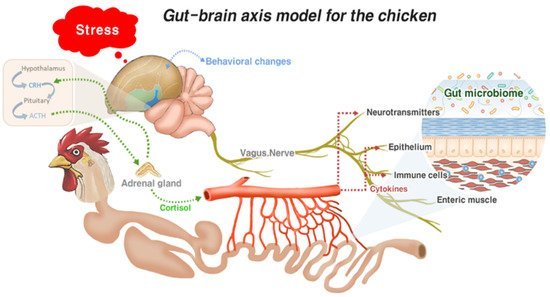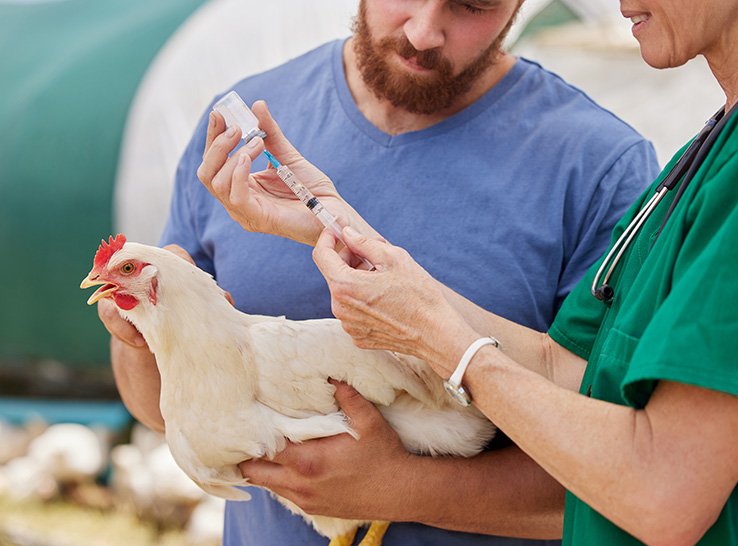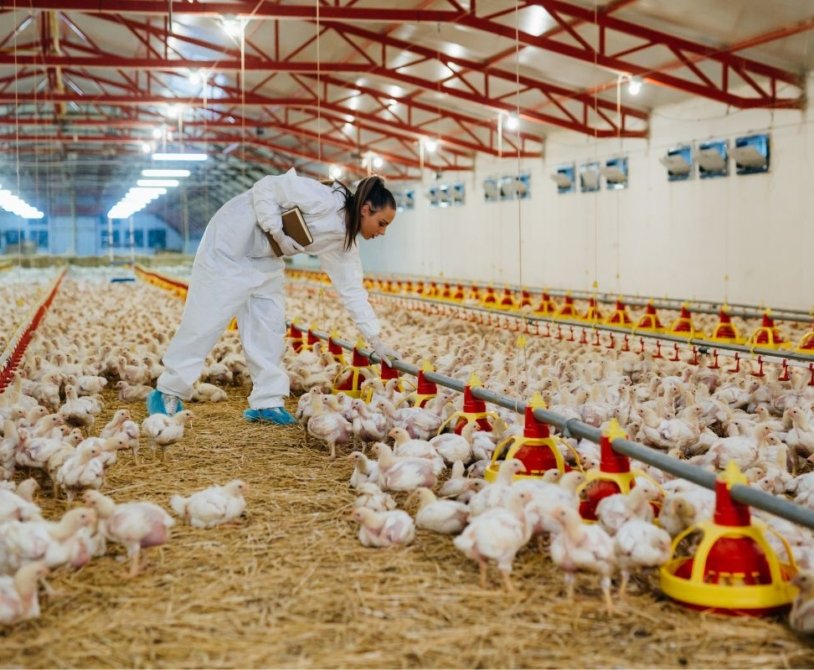In the world of poultry, gut health is key to keeping broiler chickens healthy. The gut microbiome, a mix of tiny living things in the chicken’s digestive system, is vital. It affects how chickens grow, how well they do, and how they fight off diseases. This article explores how gut health helps prevent diseases in broilers, sharing tips to boost their health and profits.
Key Takeaways
- The gut microbiome is a crucial determinant of broiler health and productivity.
- Maintaining a balanced gut ecosystem can prevent common broiler diseases and improve overall flock performance.
- Nutritional strategies, such as the use of probiotics, prebiotics, and phytogenic feed additives, play a crucial role in supporting optimal gut health.
- Immune modulation through gut health management can enhance broiler resistance to diseases.
- Monitoring and assessing gut health are essential for proactive disease prevention and management in broiler production.
The Importance of Gut Health in Poultry Production
Gut health is key to poultry success. The gut microbiome is a complex mix of microbes in a bird’s gut. It helps with nutrient absorption and keeps the gut healthy.
Understanding the Gut Microbiome
The gut microbiome has good and bad microbes. A healthy mix is vital for good digestion and nutrient use. If this balance is off, it can harm growth and productivity.
Impact on Growth and Productivity
A healthy gut microbiome helps birds use nutrients well. This means they grow faster and are more productive. But an unbalanced gut can slow growth and reduce productivity.
“Maintaining a healthy gut microbiome is essential for optimizing broiler performance and profitability in poultry production.”
Knowing how important the gut microbiome is helps producers improve their flocks. This leads to better growth, feed use, and productivity.
Common Broiler Diseases Linked to Gut Health
Keeping the gut healthy is key itoraising poultry. Poor gut health can lead to many diseases in broilers. These diseases harm their growth, productivity, and health.
Necrotic enteritis is a big problem in broilers. It’s caused by too much of the bacterium Clostridium perfringens. This leads to severe inflammation and damage in the intestines. A weak gut and bad gut health make it easy for this bacterium to grow.
Coccidiosis is another disease linked to gut health. It’s caused by Eimeria parasites. These parasites harm the intestinal lining, making it hard for the chicken to absorb nutrients. This can slow down growth and make them more likely to get sick.
Dysbacteriosis is when the gut microbiome is out of balance. This can cause many health problems in broilers. A bad balance in the gut can weaken the intestines, make it hard to use nutrients, and let harmful bacteria grow.
| Disease | Causative Agent | Impact on Gut Health |
|---|---|---|
| Necrotic Enteritis | Clostridium perfringens | Severe inflammation and tissue damage in the intestines |
| Coccidiosis | Eimeria protozoan parasites | Invasion and damage to the intestinal lining, reduced nutrient absorption |
| Dysbacteriosis | Imbalance in gut microbiome | Impaired intestinal integrity, reduced nutrient utilization, and increased risk of opportunistic pathogens |
Knowing how gut health affects these diseases helps producers. They can work on keeping the gut balanced and strong. This supports the health and productivity of their broiler flocks.
The Role of Gut Health in Preventing Broiler Chicken Diseases
Keeping the gut healthy is key to stopping many diseases in broiler chickens. The gut microbiome, full of good bacteria, is vital for their health. Knowing how gut health fights off diseases helps farmers protect their birds.
A healthy gut boosts the immune system, helping chickens fight off sickness. It does this by making antimicrobial compounds and regulating inflammation. It also helps specific immune cells work better.
Also, a strong gut barrier stops bad stuff from getting in. Keeping the gut lining strong is important. It keeps pathogens out and prevents diseases.
Gut Health and Disease Resistance
Chickens with a strong gut microbiome are less likely to get sick. They are less likely to get necrotic enteritis, coccidiosis, and avian influenza. A healthy gut supports the immune system and keeps the gut lining strong, reducing the need for antibiotics.
| Poultry Disease | Gut Health Impact | Disease Prevention |
|---|---|---|
| Necrotic Enteritis | An imbalance in the gut microbiome can lead to the overgrowth of Clostridium perfringens | Maintaining a diverse and balanced gut microbiome can prevent the proliferation of pathogenic bacteria. |
| Coccidiosis | Damage to the intestinal lining can increase susceptibility to Eimeria protozoa. | Strengthening the gut barrier and immune response can enhance resistance to coccidiosis. |
| Avian Influenza | Gut inflammation and disruption of the gut microbiome can increase viral infection risk. | Promoting gut health can boost the birds’ ability to fight off avian influenza viruses. |
Poultry producers can use antibiotic alternatives and immune-modulating supplements to keep their flocks healthy. Understanding the role of gut health in disease prevention is crucial.
Gut Health and Intestinal Integrity
A healthy gut is key to absorbing nutrients well. It also helps keep the intestinal barrier strong. This barrier stops harmful pathogens and toxins from getting in and harming the immune system.
Maintaining a Healthy Gut Barrier
Keeping the gut barrier healthy is a delicate task. It needs a good balance of nutrients and a diverse gut microbiome. The immune system also helps by defending against threats.
Here are ways to support a healthy gut barrier:
- Promote a balanced gut microbiome with prebiotics and probiotics.
- Make sure to eat enough nutrients, especially zinc, vitamin A, and glutamine.
- Boost the immune system by improving gut-associated lymphoid tissue (GALT).
By keeping the gut barrier strong, poultry farmers can stop pathogens and toxins. This helps with gut health, intestinal integrity, and immune modulation in their birds.
| Key Factors for Maintaining Gut Barrier Integrity | Description |
|---|---|
| Gut Microbiome Balance | A diverse and thriving gut microbiome is essential for supporting the structural and functional integrity of the intestinal lining. |
| Nutrient Availability | Adequate intake of key nutrients, such as zinc, vitamin A, and glutamine, is critical for maintaining gut barrier function. |
| Immune Modulation | The immune system plays a crucial role in regulating the gut barrier, helping to defend against potential threats. |
“Maintaining a healthy gut barrier is a fundamental aspect of gut health and is crucial for preventing the entry of pathogens and toxins into the body.”
Nutritional Strategies for Optimal Gut Health
Keeping a healthy gut is key to good poultry production and stopping broiler diseases. Luckily, there are many ways to help the gut stay healthy without using antibiotics in chicken farms.
Using prebiotics and probiotics is a smart move. Prebiotics are special fibers that feed the good bacteria in our guts. Probiotics are live bacteria that can be added to food to keep our guts healthy.
- Prebiotics like inulin, fructooligosaccharides (FOS), and galactooligosaccharides (GOS) help keep the gut strong and boost the immune system in chickens.
- Probiotic strains like Lactobacillus, Bifidobacterium, and Bacillus help chickens grow better, fight off bad bacteria, and stay healthy in their intestines.
Phytoogenic feed additives are also worth trying. These are natural compounds from plants, like essential oils and herbs, that can help the gut and keep it strong. Oregano, garlic, and cinnamon are good examples because they fight off bad bacteria and keep the gut healthy.
“Maintaining a healthy gut is the foundation for optimal broiler performance and disease prevention.”
By adding these nutrients to chicken food, farmers can keep the gut healthy, improve how chickens grow, and use fewer antibiotics. This leads to healthier and more productive chickens.
Antibiotic Alternatives for Gut Health Management
In the poultry industry, keeping the gut healthy is key to stopping diseases and boosting productivity. With worries about antibiotic resistance growing, producers are looking for new ways to keep gut health in check. They want to do this without just using traditional antibiotics.
Probiotics and Prebiotics
Probiotics are good bacteria and yeasts that help our gut. They are added to the broiler’s food to balance the gut’s bacteria. This helps keep the gut strong and boosts the immune system. Prebiotics are special fibers that feed these good bacteria, helping them grow.
- Probiotics, like Lactobacillus and Bifidobacterium, help with nutrient absorption and fight off bad bacteria. They also help the immune system work better.
- Prebiotics, such as inulin and FOS, feed the good bacteria in our gut, helping them grow and work well.
Phytogenic Feed Additives
Phytogenic feed additives come from plants and are a good alternative to antibiotics. These natural items, like essential oils and herbs, fight off bad bacteria and reduce inflammation. They help create a healthier gut environment.
- Essential oils from plants like oregano and thyme fight off bad gut bacteria.
- Herbal extracts from turmeric and ginger reduce inflammation and support the gut.
- Certain spices, like black pepper, help with nutrient absorption and gut health.
Using probiotics, prebiotics, and phytogenic feed additives in broiler diets helps manage gut health. This is a good alternative to antibiotics. It keeps the birds healthy and productive.
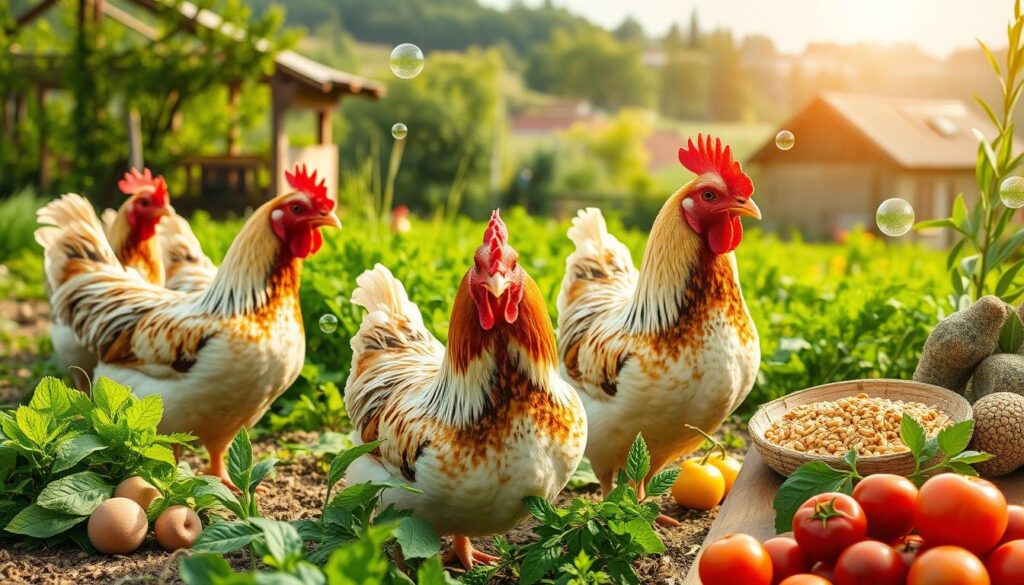
Immune Modulation Through Gut Health
Keeping a broiler’s gut healthy is key to their growth and immune system. The gut microbiome and immune response are closely linked. This connection helps poultry producers make their flocks more resistant to diseases.
The gut microbiome is full of good bacteria that shape the immune system. These bacteria help the immune cells by making antibodies and cytokines. A healthy gut microbiome means birds can fight off diseases better, without needing many antibiotics.
Using probiotics and prebiotics can boost a bird’s immune system. These natural helpers keep the gut microbiome balanced. They help good bacteria grow and strengthen the gut, leading to a stronger immune response.
“Optimizing gut health is a holistic approach to enhancing disease resistance in broiler chickens, reducing the reliance on antibiotics and supporting sustainable poultry production.”
By focusing on gut health, poultry producers can make their flocks healthier and more resilient. This approach improves the success and sustainability of their poultry operations.
Environmental Factors Affecting Gut Health
Keeping the gut microbiome balanced in broiler chickens is key fotoheir health and better poultry production. But many environmental factors on the farm can impact their gut health.
Hygiene and Biosecurity
One big factor is the farm’s hygiene and biosecurity. Good hygiene and strong biosecurity help stop harmful pathogens. These pathogens can upset the gut’s balance.
A good biosecurity plan should have:
- Strict sanitation protocols for everything
- Controlled access to the farm and quarantine procedures for new birds or visitors
- Regular cleaning and disinfection of the area
- Effective pest control to lower pathogen risk
By focusing on hygiene and biosecurity, farmers can help keep the gut healthy. This reduces health problems and boosts poultry production.
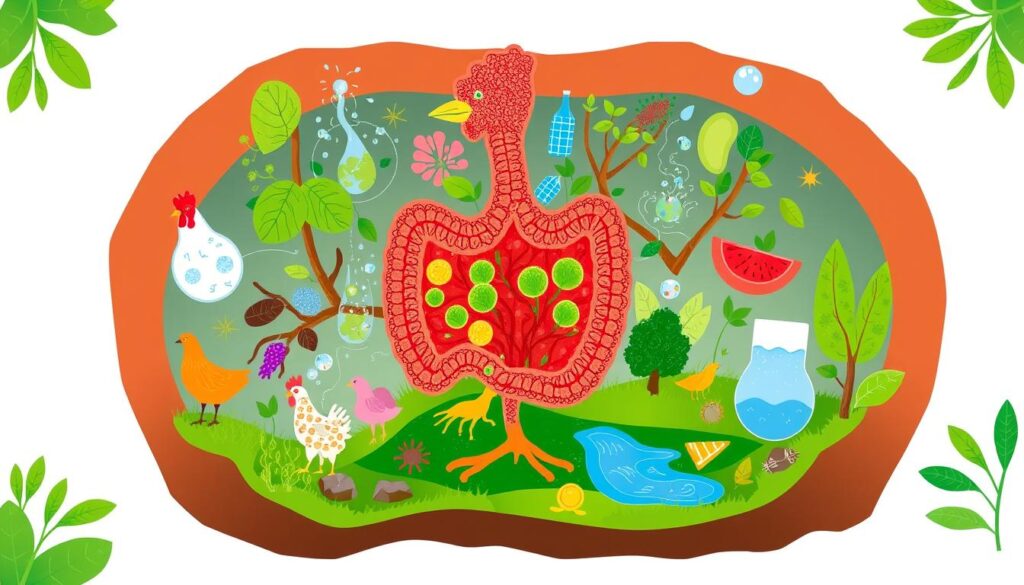
“Maintaining high standards of hygiene and biosecurity is essential for preserving the delicate balance of the gut microbiome and promoting overall gut health in broiler chickens.”
Monitoring and Assessing Gut Health in Broilers
Keeping the gut healthy is key to toiler chickens’ well-being and productivity. Regular checks and assessments are vital. This section looks at how to monitor your birds’ gut health.
Fecal analysis is a main way to check gut health. It shows the balance of gut bacteria. This helps spot any problems that might affect the birds’ health and performance. It’s a simple way to keep track of your flock’s gut health over time.
Intestinal tissue sampling also gives important insights. It involves taking tissue samples from the intestine. These samples can show the gut’s lining, inflammation, and overall health. Though more invasive, it offers a detailed look at the gut’s inner workings.
| Gut Health Assessment Technique | Advantages | Limitations |
|---|---|---|
| Fecal Analysis |
|
|
| Intestinal Tissue Sampling |
|
|
Using both fecal analysis and intestinal tissue sampling can give a full picture of gut health. This knowledge helps poultry producers make better decisions. It supports better gut function, bird health, and productivity.
“Maintaining a healthy gut microbiome is essential for the overall well-being and performance of broiler chickens. Regular monitoring and assessment are the keys to identifying and addressing any potential gut health issues.”
Gut health plays a key role in keeping broiler chickens healthy. A healthy gut microbiome is vital for their growth and well-being. Understanding how gut health affects theirthene system is important for disease prevention.
Using probiotics, prebiotics, and phytogenic feed additives can boost gut health. These help reduce the need for antibiotics. Keeping the environment clean and safe also helps maintain a strong gut barrier.
The focus on gut health, antibiotic alternatives, and immune modulation will grow. This is to fight poultry diseases and ensure broiler chickens are raised sustainably. By using proven methods, producers can improve their flocks’ health and the poultry industry’s success.
FAQ
What is the importance of gut health in poultry production?
Gut health is key in poultry production. It affects growth, feed efficiency, and productivity in broiler chickens. A balanced gut microbiome is vital for good intestinal function, nutrient absorption, and a strong immune system.
What are the common broiler diseases linked to gut health?
Necrotic enteritis, coccidiosis, and dysbacteriosis are linked to gut health in broilers. Gut imbalances and weak intestinal walls can lead to these diseases. This results in lower performance and higher mortality rates.
How does gut health play a role in preventing broiler chicken diseases?
A healthy gut microbiome, strong intestinal walls, and a good immune system help fight diseases in broilers. By keeping the gut balanced, producers can block pathogens and cut down on antibiotics.
What are the key nutritional strategies for optimizing gut health in broilers?
Prebiotics, probiotics, and phytogenic feed additives are crucial for gut health in broilers. They support a balanced gut, strengthen intestinal walls, and reduce antibiotic use. These strategies promote a healthy gut and improve broiler health and performance.
How can antibiotic alternatives be used to manage gut health in broilers?
Probiotics, prebiotics, and phytogenic feed additives can replace antibiotics for gut health in broilers. They help manage the gut microbiome, strengthen intestinal walls, and boost the immune system. This approach reduces antibiotic use while keeping gut health and disease resistance high.
How can gut health be leveraged to modulate the immune system in broilers?
The gut microbiome and immune system work together. Optimizing gut health boosts disease resistance and cuts down on antibiotics in broilers. A balanced gut environment strengthens the immune system and improves poultry health.
What environmental factors can affect gut health in broilers?
Keeping poultry facilities clean and secure is vital for gut health in broilers. Environmental factors like litter management and sanitation greatly impact gut health. High hygiene standards prevent pathogens and maintain a balanced gut microbiome.
How can gut health be monitored and assessed in broiler production?
Fecal analysis and intestinal tissue sampling are used to check gut health in broilers. These methods help evaluate the gut microbiome and spot imbalances or issues. This information guides targeted interventions to keep gut health optimal and prevent diseases.


